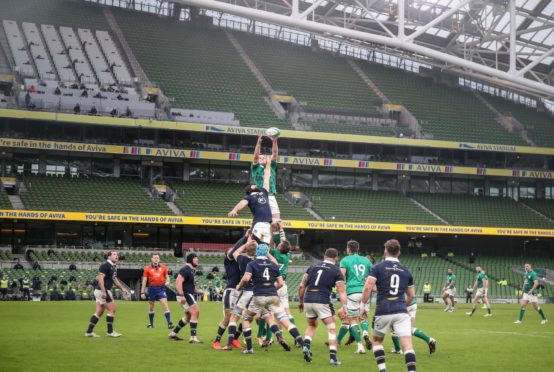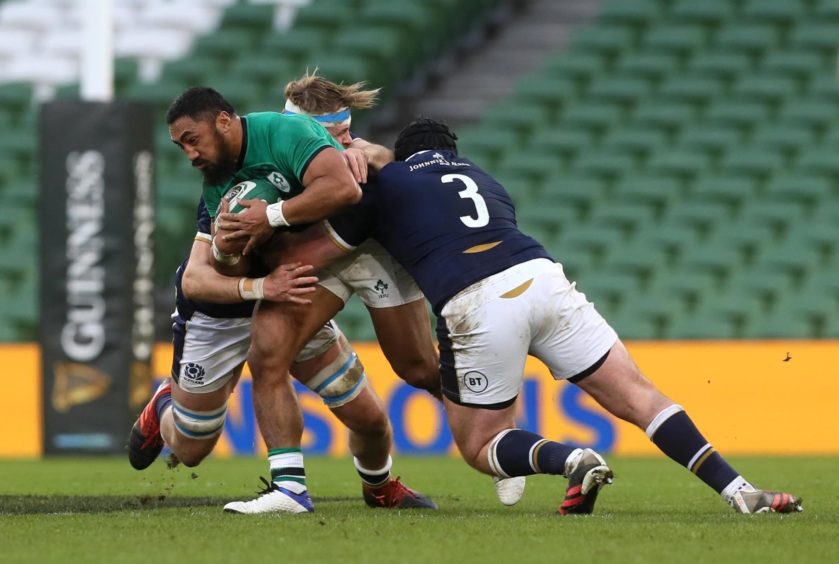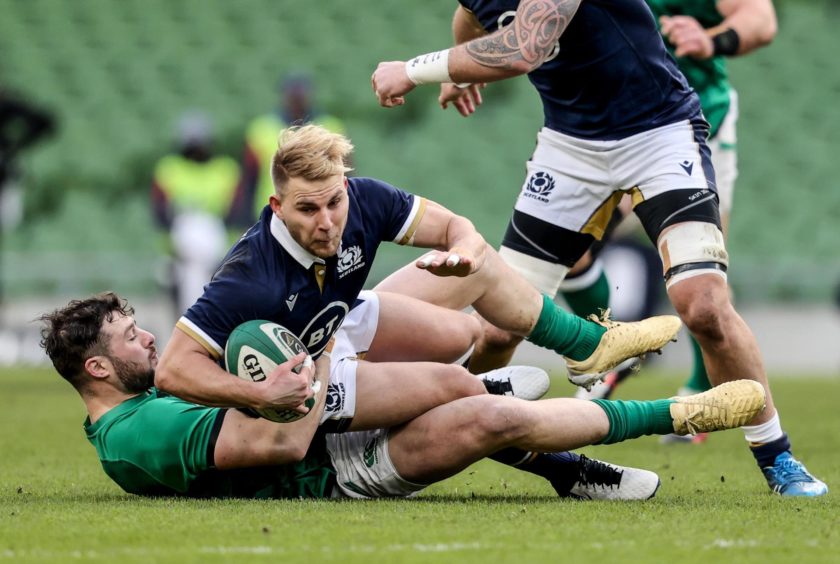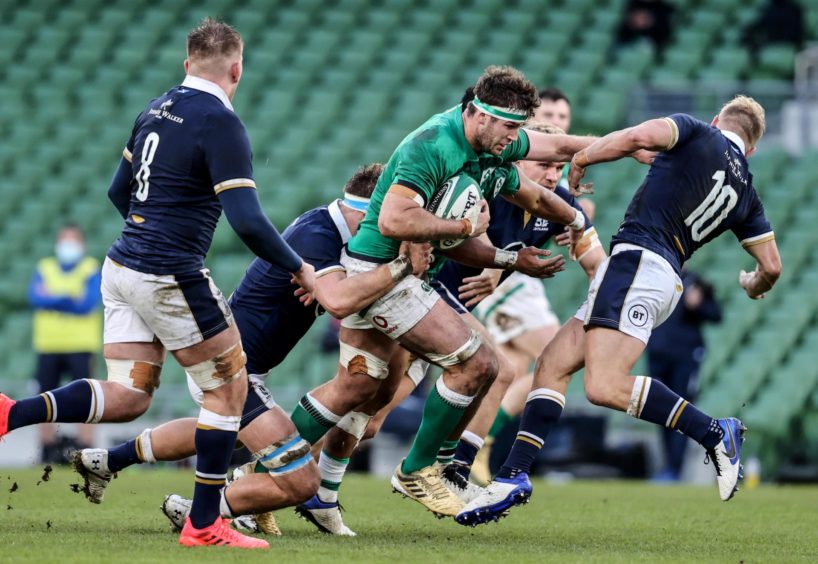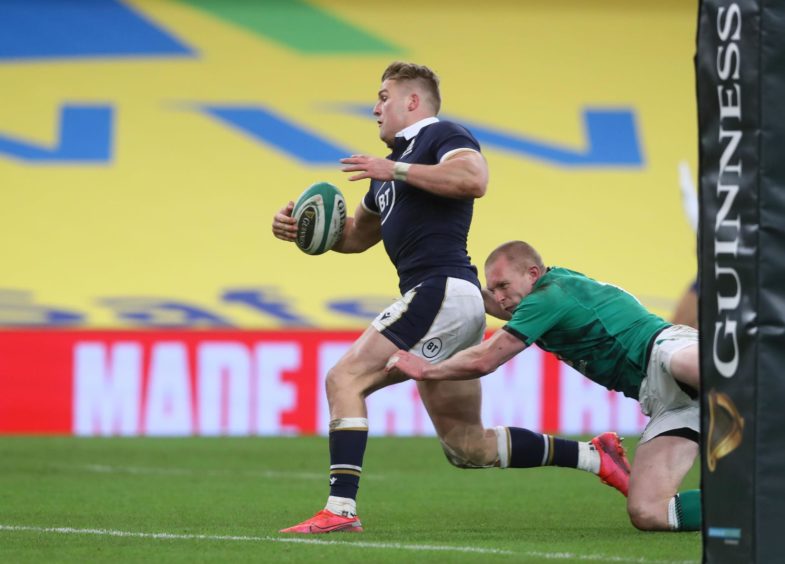“We’re a work in progress” said both Gregor Townsend and Andy Farrell, barely separated by 15 minutes in the interview room of the Aviva Stadium in the aftermath of Ireland’s eventually routine 31-16 win over Scotland.
Some team’s progress is more advanced than others. For all Scotland’s talk about how close they are to being competitive across the board – this was the first loss this season by more than a single score – it was clear evidence that there’s still a way to go before they’re able to compete with Ireland, much less England, who are the Scots’ next opponents in February (probably).
The third place play-off of the Autumn Nations Cup was just as mundane as it sounds, another to add to the list of roundly forgettable Scottish visits to the Aviva.
It followed a familiar path as well to those as well, spoiling the narrative that the Scottish defence is an increasingly tough nut to crack. Ireland managed it three times in 10 minutes either side of half-time, and that was effectively the game.
Here’s the main talking points for Scotland’s poor finish to an odd international season…
Discipline has not been good enough
Against a station-to-station team like Ireland so clinical inside the opposition 22, surrendering midfield penalties with such abandon is wrapping up opportunities in ribbons and bows.
Ireland’s maul wasn’t as dominating as it has been, but if it doesn’t work they can still pound it up with Bundee Aki and their big back row and simply grind their way to the line.
Without Hamish Watson to threaten the ball carrier, the Irish could bash away with impunity when they got into the 22. The Scottish defence held on occasion, but Ireland manoeuvred two tries for Keith Earls (who else against Scotland) showing a little wit, and both times knowing they had yet another penalty in their pockets.
15 penalties conceded is simply dire – you’re aiming for at least single figures in international rugby. Playing on the edge is all very well but when referees like Matt Carley start to focus on you, it’s time to back off.
Poor discipline has been a trend with Scotland this year – it was when Townsend coached Glasgow. They might get away with it against some, but definitely not against a team geared to taking opportunities like Ireland. It needs to be cleaned up.
The defence has hugely improved, but lapses have been too costly
Scotland had the best defence in the Six Nations, and no defence is completely faultless. But it seems that in games this autumn the slightest lapse has resulted in concession of tries.
Fraser Brown overthrew a lineout in Llanelli. Duncan Weir missed a tackle in Florence. Weir and Ali Price didn’t spot France’s Vincent Rattez coming off his wing and left a hole bigger than a barn door.
On Saturday, Darcy Graham didn’t get up nearly high enough to defend a speculative kick from Jonathan Sexton – he’s decent enough in that area despite his height – and allowed Robbie Henshaw to flick it back to Earls.
A key try resulted every time, and the last two changed a solid position for Scotland into chasing a game. Against the top teams that’s more often than not a losing situation.
Jaco van der Walt was solid enough, but…
The other third place play-off at the Aviva was over Scotland’s No 10 shirt. Van der Walt kicked as well as Duncan Weir and offered a little more threat with ball in hand. But Scotland’s score – their sole strike try this autumn not based on forwards pounding inside five metres – was all Duhan van der Merwe.
There was nothing to suggest that the debutant should unseat Finn Russell and Adam Hastings – or even really compete with them – for the first two stops on the cab rank. It was worth looking, but we simply discovered an emergency option we hope not to have to use.
The back row balance was better before
Hamish Watson was “rested”, but in the wrong game. The Italy match would have been the time to see whether Blade Thomson is that much better at 6 than at 8, and find out that he really isn’t.
Watson and Jamie Ritchie compliment each other superbly, and the issue in the back row is getting something at No 8 – a true power carrier like Caelan Doris is for Ireland, preferably. There’s no obvious candidate for that role right now.
Plus points?
It shouldn’t be all gloom. Those agitating for Townsend to go – news on that folks, he’s about to sign a three-year extension – or Stuart Hogg to be deposed as captain need to calm down.
The scrum is still solid, and Pierre Schoeman enters the mix in the summer. Scott Cummings is developing into a complimentary force alongside Jonny Gray.
If they can protect Ali Price, he’s the best all-round force at 9. Duhan van der Merwe looks born to test rugby. Duncan Taylor looks like he has more to offer if he can stay fit.
There’s still missing pieces, but Scotland are in better shape at the end of 2020 than they were at the end of 2019 – they played nine tests this year, winning five, with just an hour of their most creative player.
If the current pace of progress isn’t quick enough for you, a heavy dose of realism and perspective is required.
